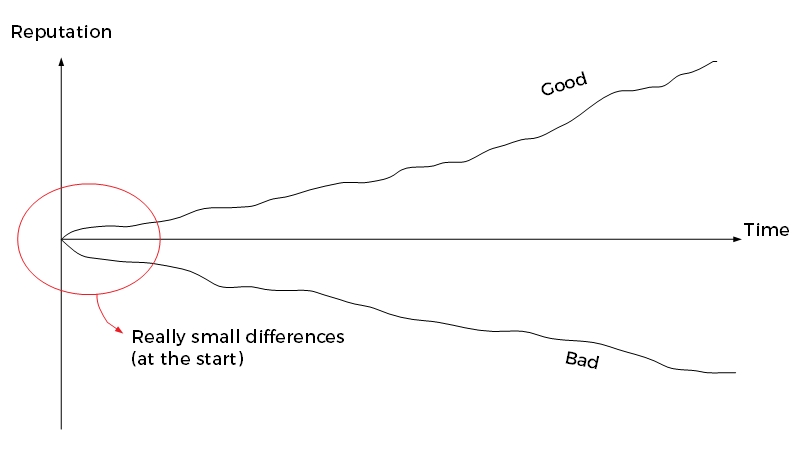The thing about getting older is it sneaks up on you. Each year goes by, not too different from the year before. Then suddenly you look up, realize you’re 35 and have already been working for 12 years.
But what’s the point of getting older, if you don’t get to share some tips for the younger generation?
So when a student (about to start her internship) recently wrote to me asking for advice, I thought it’d be useful to share what I’ve learned about the working world.
Having gone through 4 companies, 3 different industries, 3 promotions (+officially 1 demotion), 10 bosses (people I report to), 25 employees (people who report to me), and 7 interns, this is the career advice I would give someone who’s about to start an internship.
1. Attitude Is Almost Everything
Let’s start with the most important thing: attitude. In the eyes of your new colleagues and bosses, you’re young and unproven. I know your mother and boyfriend think you’re awesome, but for the rest of us, you’ll have to prove yourself.
This means people are looking closely at the way you do things. And labeling you: “excellent,” “good,” “meh” or “sucks.”
“But why look at attitude, and not my skills?” you ask. “Sure, I’m a lil’ lazy and I come to work late — but look at how well I can code!”
Because at the start of your career, your skills likely aren’t strong enough to compensate for bad attitude. Even if you think your skills are in the Top 0.1% of the world (sure or not?), understand that plenty of companies have “No Asshole” policies. You wouldn’t be able to survive even if you were Steve Jobs.
We’re not asking you to be perfect. We’re asking you to try your hardest.
2. Examples of Good Attitude Please?
These are really simple examples, but you’d be surprised at how uncommon they are in the working world.
Helpfulness
Are you at work just because you wanna get paid doing the least amount of work possible? Or are you willing to put extra effort to help your peers, seniors and bosses? Being helpful is never a waste of time, because you learn things. Not to mention you also become more likable and influential.
Simple way to demonstrate this: Ask “Is there any other work I can help you with?” often.
Responsibility
When your boss assigns you something to do, do you “own” it? Can he trust it completely to you, or does he need to keep worrying and checking in if you’ve done it already?
I bet you’ve heard horror stories of bosses who micromanage. Well, being responsible with your work is the antidote. Because when they trust you, they don’t micromanage.
Simple way to demonstrate this: Give your boss frequent updates on the progress of your assignments.
Conscientiousness
A really complicated way of saying f*cking do your work well. A conscientious person is responsible and reliable. Even if something goes wrong, she has a backup plan.
Conscientiousness is so important that research has shown it’s a strong predictor of success in life.
Good example: a report that has good content, is presented well, and is saved in two separate locations… for contingency.
Bad example: a lazy resume. I could rant about this all day, but if you ask me to estimate the percentage of perfect resumes I’ve reviewed in my life, based on 3 simple things: spelling, grammar & consistent formatting — it’s less than 10%.
Maybe you’ll say I’m psycho — looking out for the smallest imperfections. But if someone doesn’t care enough to make such an important document perfect, how do you think she will perform at work?
Simple way to demonstrate this: Schedule a regular “feedback” session with your boss. Ask “How can I make my work better?” often.
Curiosity
Are you interested in learning new things? Are you open to new ways of thinking and doing things? We live in a complex world that constantly changes. Without curiosity, you’ll get left behind.
Simple way to demonstrate this: Put effort into your own research, but also ask questions that you can’t figure out yourself. When our subordinates don’t ask questions, we worry they’re not interested to learn.
Pro-tip: Be curious about people too. Build relationships and ask them for advice. Research has shown that having connections to diverse groups of people is another strong predictor of success.

3. Great Communication Is Learned
So now you’ve got your attitude sorted. What’s next? Well, because you’re gonna be working with people older than you, you’ve gotta start learning how to communicate with them. And in case you haven’t figured it out yet, working people communicate differently from you.
This means you’ll have to learn “ancient” ways of communication, such as emails and face-to-face team meetings. You’ll have to figure out the subtleties of when and how to say things, and who to say them to. These little things may seem infuriatingly slow and meaningless to you. But understand that every form of communication has its place in society.
Just because old people are using it doesn’t mean it’s bad. Because if you wanna get things done, you have to speak the language of people you’re interacting with.
The best performers master multiple forms of communication to achieve their goals.
If an oldie like me can learn how to use Snapchat, I’m sure a smart young gun like you can learn to write formal emails.
4. The Slippery Slope of a Reputation
On to the next tip: remember how I said at the beginning of your career, people make their minds up about you very quickly?
All it takes is for you to miss expectations a few times — for example submitting careless work, or sending it in late — for people to label you as a poor performer.
But that’s not the worst part. Because reputations are built cumulatively, the awful thing about developing a bad reputation is it gets harder and harder to get rid of. Think about the creepy guy in your class that nobody likes. No matter what good he does, it always seems dodgy — because he’s already developed that reputation.
Once peoples’ perceptions of you are set, it takes a huge amount of effort to change their minds.
Luckily, you can also use this to your advantage. If you consistently beat expectations, you quickly develop a reputation as a “high performer.” Again, at the beginning of your career, this comes down to the simplest things. Like if your meeting is at 11 a.m., are you already in the room at 10:50, having read through the agenda and done your research?
Moral of the story: you always need to perform well. But at the start, this is especially important.

5. Make It Easy for People to Help You
How do some people magically get many things done in a short time? Why do some people get prioritized while others get ignored? Welcome to the challenging world of asking for support. Because at work, you’re going to have to rely on other people.
“But I’m just a young intern. What if people ignore my requests? I’m not their boss so they don’t have to listen to me. How!?”
Part of this comes down to influence. Like if you’re helpful yourself, have a good reputation, and can communicate well (refer points above) — people are more likely to help you. But since we’ve already covered the “who,” here’s the “how to request for help.”
Surprisingly, it comes down to empathy. Which is putting yourself into someone else’s shoes and trying to understand them.
Here’s a fictional example from McDonald’s:
Bad McDonald’s Request
Server: Welcome to McDonald’s! Having here or takeaway?
You: Uhm… hang on… Oh! I want to order the new value set my friend told me about.
Server: We have many new sets Miss. Could I know the name of the set? Also, are you having here or taking away?
You: I’m not sure, it’s just the new one and uhm… I know it has chicken in it…
Server: …
You: …
Server: Is it thi…
You: Hang on, let me call my friend…
Server: (Why the f*ck did I take this job again?)
You laugh at the situation above. You think about all those times you got pissed off queuing behind a bimbo like that. But the funny thing is, bad requests like this happen all the time at work. Even from people who’ve plenty of experience.
Luckily, we know better. So when we go to McDonald’s, we order like this:
Good McDonald’s Request
You: Hi, this is for takeaway. Can I have one McValue set MCB08, the limited-time promotion that ends on 31st March? For the drink, I’d like a Coke, please upgrade to Large size. No other orders.
Server: (Wow, did this guy use to work at McDonald’s?) Okay sure, total will be RM 21.70.
You: Here’s RM 20 in notes, and RM 1.70 in coins, so you don’t need to change. BTW — I’m rushing to class, possible to speed up my order?
Server: Sure thing, we’ll try our best…
See the difference?
McDonald’s for Work
Get better support by providing information quickly, and making your requests clear. This is especially true if there’s a defined process. If you provide everything the process requires, your colleague just needs to go through a routine he’s done 1,000 times before. There’s almost no thinking involved.
It’s just like how you don’t wanna visit the “Help Center” and tap your screen 20 times to do something on your phone. You want it easily done within 5 taps. Your colleagues also don’t even wanna spend one minute thinking about how to solve your problem.
Not because your seniors are stupid and lazy. But because they’re overloaded with tons of work and 20 people competing for their time.
This isn’t manipulation. It’s understanding human behavior. Ask this question often — it’ll serve you loyally from today until the day you die:
“How do you make it easy for people to say ‘Yes’?”
6. The Subtle Art of Predicting the Future
Most people go through their careers without thinking much. Thankfully, you’re not gonna be like them. In fact, you’re gonna be able to predict the future.
All you need is to keep your eyes open — observe and understand the present. Because as the saying goes, history never repeats itself, but it often rhymes.
Example time: Your boss. Because she’s so critical to your success at work, you’re gonna get to know her really well. And if you’re paying attention and asking questions, eventually you’ll be able to predict things like:
- How best to present different types of work (e.g face-to-face discussion or a written report?)
- When’s an appropriate time to share bad news (early in the morning, or late in the evening?)
- What’s the secret ingredient in getting a piece of work from okay to excellent?

Some people (usually those who aren’t doing well) would call this politics, while others would call this EQ. My advice is don’t care about labels — just focus on doing ethical, right things which help you and your team.
But the art of prediction isn’t only for your boss. Like the McDonald’s principle, you can use it for many other situations. It’s just about analyzing your current situation, thinking ahead, then adjusting your strategy to match. (Interested to go deeper on this? I also wrote this article.)
Another example: Say after interning in the HR department of a government-linked corporation for three months, you find the work doesn’t interest you. You can ask your seniors/mentors in similar jobs, and research the Internet for more clues on what a career in HR looks like. Maybe you could try a Business Development job for a startup next?
Of course, you’re gonna be wrong sometimes when you make decisions based on your predictions. But you’ll always learn something valuable. As the Greek philosopher Socrates once said:
“The unexamined life is not worth living.”
– – –
I’m writing this now because the older I get, the harder it’ll be for me to remember how a 21 year old thinks. I’m already starting to feel like I’m losing touch.
What I do remember is how excited I was to get started. And also how scary it was. If you’re feeling the same, don’t worry — we all went through it once.
The good news is that an internship is almost like a “Reset” button in life. You’re gonna be a in a new place where most people don’t know you, starting from scratch. There will be tremendous new opportunities; as long as you’re willing to grow and learn.
If there are things you don’t like about yourself, but have been carrying along due to reputation, guess what — this is your chance to reinvent yourself.
A chance to be someone you’ve always wanted to be.
Good luck.
– – –
Pics from Pexels: Pixabay, Michaela, rawpixel.com




This is very helpful even for people like me, who has been working for a few years now. Sometimes we tend to forget what are the basics, this article serves as a refresher for all of us in the workforce.
Besides that, i will also like to chip in a bit to the article is that, we should never Assume at all times. Assumptions always put us into trouble and you will end up in bad shape.
Thank you!
Thanks very much!
This is such a helpful article, the advice is very practical! Tho I have already passed my internship period and now work as a part-timer with the same company, I totally agree with the part where you said we have to speak the language of the people we work with, and I am still kinda struggling with it.
Not that I have any difficult work communication with my team and my boss, but sometimes I just find it hard to mingle because I feel like I am the college kiddo in the adult world, and the worst part, I am quite an introvert at work. I think mostly because I don’t feel like I deserve tho for quite some times I proved myself to be helpful, but still, I feel so small oftentimes.
But now that I am going to transition into full time right after graduation, I think I gonna have to reposition myself and scrap that “college kid” label I attached to myself. Thanks so much!
Hey Lin,
Thanks for dropping by. You’ll do just fine. Just give it some time. If you ever have any questions, feel free to drop me a note. All the best!
I’ve enjoyed reading thru this article,
It may serve as a great piece of advice for interns, but also is a great compass for more experience individuals who caught up in stress at work or trying to muddle thru their work environment and not sure what is the cause of their being stuck.
I would add the word “active attitude” as a tool to bring higher performance and job satisfaction at the same time.
Thanks so much Rostislav. Appreciate your kind comment very much!
What I don’t like about internships if they are unpaid ones and if they are not going to give you the experience that they claim they will give you. I had a talk with my computer teacher about it when one of the students brought up internships. I think it is real stupid to expect people to work for free in an internship when they have to pay bills and eat and drink like everyone else. How would CEOs like it if they were told that they were not going to get paid for their work? You would bet that they would quit their jobs before they work for free.
Fully agreed that internships should be paid. Very cruel to underpay/not pay!
Thanks for writing this gem shared it on LinkedIn. I always remembered my ex boss advice “Your job is to make your boss job easier, relieve his stress, do the thinking for him, plan it through, and he will most likely say yes go ahead!”
Thanks so much for the powerful advice Stephen!
Not sure is this just coincidence or luck, but I was in the train going for an interview for an internship position and somehow came upon your article on twitter. Thank you for your advice because not everyone will spare the time to write about the real truth of the corporate world that I’m just only stepping in.
BTW, I’m also a UTP student. I read on different blog post that you’re a UTP alumni too. Keep up the good work. Had been binge reading your blog posts ever since then 🙂
Hi Shwe Wen,
So good to hear from you! Always happy to hear from my super juniors… How did the interview go? And please let me know if there’s anything I can write about that will be helpful…